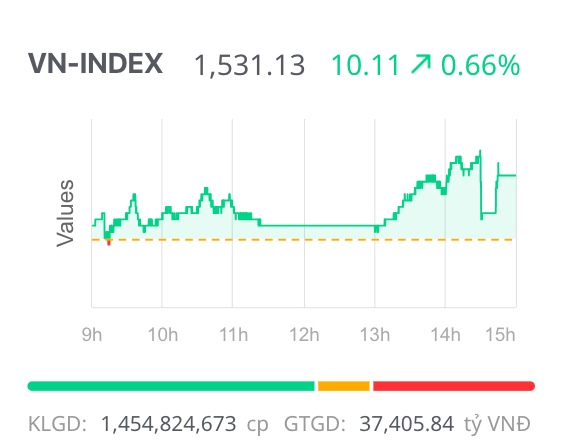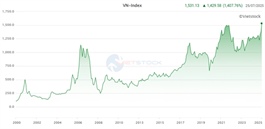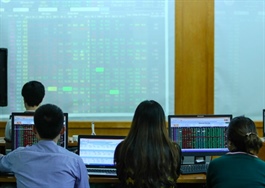Vietnam's stock market at 25: a pillar of economic reform and capital growth
Vietnam's stock market at 25: a pillar of economic reform and capital growth
After 25 years of development, Vietnam’s stock market has become a vital channel for medium- and long-term capital, reflecting the strength of national reforms and integration, as rising domestic capital and infrastructure upgrades accelerate progress.

VN-Index reaching its peak of 1,531 points in July, affirming the attraction of the stock market |
July 28, 2000, marked the first trading session of the Vietnamese stock market, which initially featured only two stocks. 25 years later, the market has grown to become an important medium- and long-term capital channel for the economy, and a symbol of the country's integration, reform, and sustainable development in the new era.
Bui Ngoc Trung of Mirae Asset Securities Vietnam noted that the Vietnamese stock market’s most significant achievement over the past 25 years has been its growing role in complementing the banking system by supporting capital needs, while also deepening integration with global financial markets.
"Vietnam’s anticipated upgrade to emerging market status clearly reflects ongoing efforts to improve market operations, standardise infrastructure, and enhance transparency. To date, the market has reached a capitalisation of approximately VND7 quadrillion ($280 billion), or 70 per cent of GDP, with hundreds of listed companies and over 10 million investor accounts – representing around 10 per cent of the population," said Trung.
The stock market’s growth is driven not only by scale but also by improvements in capital quality and investor composition. In 2024–2025, domestic cash flow – particularly from individual investors – is rising sharply. Major private enterprises such as Vingroup and Hoa Phat are taking the lead, leveraging the capital market to expand their operations and diversify funding sources.
The KRX system, non-prefunding mechanism, and the planned central counterparty (CCP) in 2026 lay the groundwork for introducing new products such as T+0 settlement and short selling. Enhancing transparency, curbing speculation, and improving the quality of listed assets will be essential to attracting foreign capital as the market moves towards an upgrade.
Vietnam’s stock market has demonstrated strong adaptability over the last quarter-century in the face of global and domestic shocks. According to Nguyen Cong Trang, deputy director of FinSuccess Investment JSC, major events such as the 2007 global financial crisis, US-China trade tensions in 2018, the Covid-19 pandemic, the bond market turbulence, and systemic risks during 2022-2023 have tested and ultimately strengthened the market’s resilience.
"The key factor in the coming period is synchronous development. When the international financial centre is considered as the foundation for the country to enter a new era of development, the comprehensive upgrading of the financial market, including the stock market, should be a central task," Trung said.
Trung believes the current environment is ripe for a market breakthrough, supported by political stability, a strong orientation towards private sector growth, institutional reform, and the transformation of domestic enterprises. However, he cautions that if the three key pillars – corporate governance, enterprise capability, and investor sophistication – fall short of expectations, the market could face renewed volatility.
Sharing a similar long-term perspective, Truong Dac Nguyen, investment director at Blue Horizon JSC, said the VN-Index reaching its peak of 1,531 points in July is more than just a numerical milestone; it affirms the enduring value built over 25 years of market development.
"The stock market is more than just a platform for capital mobilisation – it also drives the equitisation of state-owned enterprises, supports modern governance practices, and enhances operational transparency," said Nguyen.
Large companies such as Saigon Beer-Alcohol-Beverage Corporation, PetroVietnam Gas, Binh Son Refining and Petrochemical JSC, and Vietnam Airlines, are noteworthy cases for their transitions to a publicly listed enterprise model, requiring clear valuation, audited financial statements, periodic information disclosure and supervision from shareholders.
According to Nguyen, "The stock market has become a natural filter to classify, screen, and motivate truly capable enterprises that have the desire to develop and grow. In addition, the market has also contributed to modern financial thinking for people."
Nguyen also noted that improved liquidity and the recent return of foreign capital reflect growing investor confidence. Foreign investors are drawn to markets that are transparent, dynamic, and stable. This renewed interest is expected to pave the way for strategic partnerships and large-scale merger and acquisition deals, enabling domestic enterprises to expand and adopt more advanced technologies.
However, to sustain this capital inflow, Vietnam must continue improving market access conditions by easing foreign ownership limits, addressing payment system barriers, and ensuring a transparent, efficient experience for global investors. The market also needs to broaden its product ecosystem – from specialised funds and sector-based derivatives to environmental, social, and governance offerings – in line with international trends.
Over the past 25 years, Vietnam’s stock market has established itself as a vital capital channel, a mechanism for corporate restructuring, and a barometer of economic growth expectations. Looking ahead, to serve as a strong pillar of national finance, the market will require a robust legal framework, a diversified product ecosystem, and the prominent participation of the country's leading enterprises.
- 16:26 28/07/2025
























